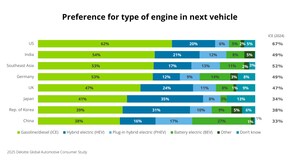NEW YORK, Sept. 12, 2012 /PRNewswire/ -- As high unemployment persists and the global economic recovery remains halting and uneven, the "resume tsunami" appears to have been reduced to a "resume riptide." According to Deloitte's new global talent survey, Talent 2020, four out of five (80 percent) employees plan to stay with their organizations over the next year, a significant increase from 2011 when nearly 65 percent were planning to leave. Forty-six percent of the survey respondents indicate they are less inclined to move because, in the last 12 months, they have changed jobs (9 percent), were promoted (22 percent), or have taken new positions (15 percent) with their current employers. Surprisingly, however, nearly one-third (31 percent) say they are not satisfied with their jobs.
(Logo: http://photos.prnewswire.com/prnh/20120803/MM52028LOGO-a )
(Logo: http://photos.prnewswire.com/prnh/20120803/MM52028LOGO-b )
Out of a false sense of security, companies may neglect their talent and retention strategies as more employees appear to be staying put. However, the Deloitte report warns that organizations' top performers are also those with the most employment opportunities.
"Instead of addressing broad concerns over high turnover rates, employers now face a more targeted challenge," said Bill Pelster, principal and U.S. Talent Services co-leader, Deloitte Consulting LLP. "Companies must adjust their talent management initiatives to focus on retaining employees with the critical skills required to advance their business in today's turbulent marketplace, as they pose the biggest flight risk."
Deloitte teamed with Forbes Insights for its fourth report in the Talent 2020 series, surveying employees across major industries and global regions. Based on the results and Deloitte's analysis of the talent market, Deloitte identified three emerging trends:
- Engage employees with meaningful work or watch them walk out the door. Employees value meaningful work over other retention initiatives. A majority (42 percent) of respondents who have been seeking new employment believe their job does not make good use of their skills and abilities.
- Focus on turnover "red zones." Employee segments at high risk of departure, or "turnover red zones," are employees with less than two years on the job and Millennial employees (those aged 31 and younger).
- When it comes to retention, leadership matters. More than six in ten employees (62 percent) who plan to stay with their current employers report high levels of trust in corporate leadership.
"Retaining key employees is not simply a human resources function," said Pelster. "Instead, retention starts with the C-suite and extends through virtually every level of management, down to line managers and supervisors. Strong leadership is one of the most important factors in differentiating between an employee who is committed to their current job and one who is constantly searching for the next career opportunity."
Who is leaving and how do companies hold onto key employees?
Interestingly, the incentives to get employees to stay are not exactly the same as the factors that would cause them to leave.
According to the survey, the top five reasons people seek new employment are primarily non-financial:
- Lack of career progress (27 percent)
- New opportunities in the market (22 percent)
- Dissatisfaction with manager or supervisor (22 percent)
- Lack of challenge in the job (21 percent)
- Lack of compensation increases (21 percent)
However, the top five retention incentives for employees are primarily financial:
- Additional bonuses or financial incentives (44 percent)
- Promotion/job advancement (42 percent)
- Additional compensation (41 percent)
- Flexible work arrangements (26 percent)
- Support and recognition from supervisors or managers (25 percent).
Other factors such as trust in leadership, effective communication and a company's ability to execute on its strategy can also differentiate between an employee who is committed to his or her current job or an employee who is searching for the next opportunity.
Additional survey findings and key takeaways
- Generation X employees are the most active in the talent market and Millennials are advancing up the career ladder the quickest.
- In terms of employee turnover, the Financial Services industry runs the highest risk of losing talent, with 25 percent of employees expressing turnover intentions over the next 12 months. Closely behind are Technology, Media and Telecommunications (23 percent) and Life Sciences and Health Care (23 percent).
- Workers in the Energy and Resources industry express the most satisfaction with their jobs, with 78 percent agreeing that "overall, I am satisfied at work."
- Employees in Europe, the Middle East and Africa are less satisfied with their jobs compared to those in Asia Pacific and the Americas.
About the Survey
"Talent 2020: Surveying the Talent Paradox from the Employee Perspective" is the fourth in a series of talent reports. Talent 2020 is a follow up to the Managing Talent in a Turbulent Economy longitudinal talent survey series. This survey was conducted in collaboration with Forbes Insights to explore the changing priorities and needs of employees at global and large national companies. This report features results from a survey that polled 560 employees at large businesses in the Americas, Asia Pacific, and Europe, the Middle East, and Africa across a range of major industries. For more information please visit www.Deloitte.com/us/talent.
As used in this document, "Deloitte" means Deloitte Consulting LLP, a subsidiary of Deloitte LLP. Please see www.deloitte.com/us/about for a detailed description of the legal structure of Deloitte LLP and its subsidiaries. Certain services may not be available to attest clients under the rules and regulations of public accounting.
SOURCE Deloitte
WANT YOUR COMPANY'S NEWS FEATURED ON PRNEWSWIRE.COM?
Newsrooms &
Influencers
Digital Media
Outlets
Journalists
Opted In






Share this article